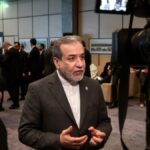
The United Nations Security Council (UNSC) is set for a vote that could open the way for the revival of sanctions on Iran over its nuclear programme.
The UNSC will vote on Friday on a resolution proposed by Russia and China seeking a delay to reimposing the penalties. UN “snapback” sanctions are set to be triggered at 00:00 GMT on Saturday, after the United Kingdom, France and Germany accused Tehran of violating a 2015 deal aimed at preventing it from developing a nuclear weapon.
- list 1 of 3Iran’s president vows to never build a nuclear bomb in his UNGA speech
- list 2 of 3Iran condemns ‘ludicrous and delusional scheme of greater Israel’
- list 3 of 3Russia, Iran sign nuclear power plants deal as sanctions loom
end of list
Should the council not approve the resolution, which seeks a six-month delay to allow for further talks, it will pave the way for the international community to reimpose an arms embargo against Tehran and a punishing global asset freeze.
The sanctions also ban the sale of materials that could be used in uranium enrichment and reprocessing, as well as ballistic missile development and travel of Iranian individuals and entities.
Diplomats have suggested that the UNSC is unlikely to pass the Russian/Chinese resolution.
The UN’s nuclear watchdog, the International Atomic Energy Agency (IAEA), had been trying to rebuild cooperation with Tehran and resume inspections of its nuclear facilities after Israel and the United States bombed the sites in June.
Before the vote, Iran has threatened to retaliate by ending its cooperation with the IAEA should sanctions be imposed.
In a post on Telegram, Foreign Minister Abbas Aragchi said Tehran’s agreement forged earlier this month with the IAEA on inspection of its nuclear sites would remain in effect only if no hostile actions are taken against his country, including any move to reinstate snapback sanctions.
Advertisement
“Otherwise, the Islamic Republic of Iran will consider its practical commitments terminated,” he added.
The Iranian Students’ News Agency also quoted him as criticising the “European Troika”, composed of France, Germany and the UK, for pushing for the reimposition of sanctions.
The three countries have been pressing Iran to allow full access to its nuclear sites for UN nuclear inspectors.
On Thursday, Araghchi met his British counterpart, Yvette Cooper, to discuss the dispute, during which he “strongly criticised the position of the three European countries as unjustified, illegal and irresponsible”, according to the Iranian Ministry of Foreign Affairs.
China and Russia are expected to put forward the resolution that would delay the reimposition of sanctions until April 18 next year in front of the UNSC later on Friday.
The draft resolution would call on all initial parties to the deal, including the US, to “immediately resume negotiations”.
Diplomats told the AFP news agency that they did not expect the 15-member UNSC to hand the resolution the nine votes needed to pass.
In a meeting with Bolivian President Luis Arce Catacora on Thursday on the sidelines of the UN General Assembly, Iranian President Masoud Pezeshkian reiterated his statement, saying Tehran is “fully prepared for any scenario” in case the UN sanctions are reimposed.
In his first UN address on Wednesday, Pezeshkian also reiterated that Tehran will “never seek to build a nuclear bomb”.
Iran has long contended that it is not seeking nuclear weapons, pointing to an edict by Supreme Leader Ayatollah Ali Khamenei, and US intelligence has not concluded that the country has decided to build a nuclear weapon.
But Israel, the US and European countries have long been sceptical due to the country’s advanced nuclear work, believing it could quickly pursue a bomb if it so decided.
British Caribbean News


